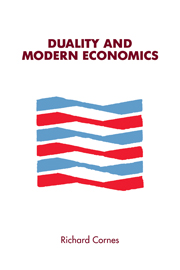Chapter 1 - Some formal preliminaries: An informal treatment
Published online by Cambridge University Press: 11 September 2009
Summary
The theme of this book is both simple and attractive. It is that the optimizing models that are the daily bread and butter of both theoretical and applied economists can be formulated in a number of different ways and that the investment of a little time and effort in becoming familiar with alternative formulations, together with a little ingenuity in exploiting some simple implications of optimality, can tremendously simplify their formal analysis. The simplicity, and indeed elegance, that can thereby be achieved allows us much more direct insight into the economic intuition that lies behind comparative static and other properties than is afforded by the old-fashioned and rather mechanical procedures that have dominated textbooks in the past. For example, the standard approach to consumer theory once was simply to maximize utility, defined over quantities consumed, subject to the budget constraint. The analysis then proceeded through the tedious and unenlightening manipulation of first- and secondorder optimality conditions, through a dense thicket of bordered Hessians, and on to statements about demand behavior whose intuitive explanation, though often simple, was in no way reflected in the tortuous mathematics. We now know that there are at least three alternative ways of stating the consumer's problem and that it pays to think about which one to use before commencing a piece of analysis. One's choice of starting point will be influenced by the nature of the questions to be asked, and some careful thought at this preliminary stage can be tremendously helpful and timesaving.
- Type
- Chapter
- Information
- Duality and Modern Economics , pp. 3 - 28Publisher: Cambridge University PressPrint publication year: 1992



